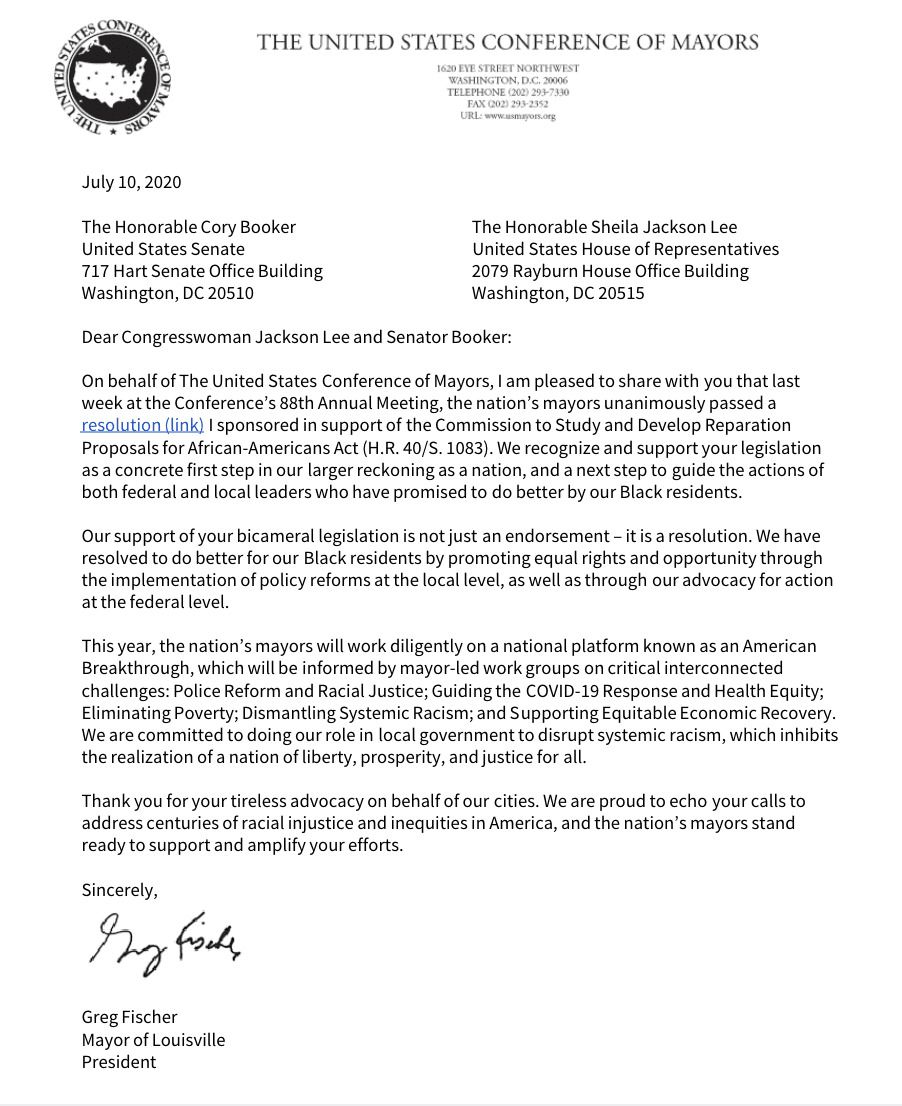Ever since the death of George Floyd and the sprawling BLM protests throughout the country, talk of reparations has reached fever pitch.
Reparations were once considered fringe, far-left demands, but have increasingly become embraced by the Democratic party.
Congress commissioned a study for reparations. It's called the "Commission to Study and Develop Reparation Proposals for African-Americans Act."
Now, a new study by 3 professors has revealed that reparations would cost not millions… not billions… not trillions…
But $6.2 QUADRILLION.
That is $151 million for every single African American in the United States.
And even that is "not enough."
More details on this jaw-dropping finding below:
Will Democrats still continue to support reparations after the finding of this new study?
Will Joe Biden be asked about this on the campaign trail?
Reparations were always a far-fetched idea with many complications, but now this study makes the concept unpalatable to most Americans.
Newsweek has more details on the study and the discussions around it:
While debates around reparations for the descendants of slaves often focus on costs of such action, advocates believe discussions must also address other efforts for systemic change.
Financial estimates are wide-ranging depending on how they are projected and thoughts on what exactly will, or even can be paid for are also divided.
"Reparations is not a check in the mail," Raymond Winbush, author of Should America Pay? Slavery and The Raging Debate on Reparations and Belinda's Petition: A Concise History of Reparations For The Transatlantic Slave Trade, told Newsweek.
"We've got to look at the difference between changing symbols and changing systems."
The growing dialogue surrounding racial justice following worldwide protests sparked by the death of George Floyd has also brought the issue to the fore. The U.S. Conference of Mayors has got behind Democratic calls in Congress to enact a study on the matter of reparations being made to the descendants of those impacted by slavery.
House Representatives could hear a bill, H.R. 40, this summer in regards to forming a committee to discuss reparations. Democratic presidential candidate Joe Biden said he could be in favor of cash reparations to African Americans and Native Americans if studies found this to be a viable option.
"I think that Black people are saying we've had enough and I think white people are coming to grips with the fact that this country owes a debt that has been unpaid," Winbush added.
If payments were to be made, the amount that would be calculated could vary dependent on how the cost is estimated, applications of factors such as interest and who would be considered eligible.
A study in The Review of the Black Political Economy journal, first published on June 19, titled "Wealth Implications of Slavery and Racial Discrimination for African American Descendants of the Enslaved," looked at the Black-white wealth gap alongside the cost of slavery and discrimination to descendants of the enslaved.
Among its estimates for the costs were around $12-$13 trillion in 2018 dollars, based upon estimates looking at land-based, stemming from the promise made to freed slaves, and price-based, considering what slave prices were.
But looking at a wage-based cost and factoring in interest it assessed the cost could be counted as up to $6.2 quadrillion as of 2018.
This amount, divided by 40,909,233 Black non-Hispanic descendants of the enslaved, could result in a total reparations payment per descendant of $151.63 million. This figure on the number of descendants may be overstated, as it likely includes some Black U.S. Residents who do not trace their ancestry back to slavery, the researchers note.
Right now, the U.S. debt is not even $30 trillion.
The cost of reparations alone would be over 200 TIMES the cost of the entire U.S. debt that has taken centuries to acquire.
If Democrats claim that the cost will be less, it's important to remember that government estimates appear to almost-always be underpriced.
When the government is involved, the cost will grow, especially if corruption is in the system.
On Monday, mayors across the country wrote a letter to Democrats asking for a plan of reparations.
The city of Asheville, NC already has moved to approve reparations.
While these once seemed like radical proposals, they are increasingly becoming mainstream in the Democratic party.
The Washington Examiner confirms:
The nation’s mayors on Monday backed a national call for reparations to 41 million black people, a program that could cost taxpayers $6.2 quadrillion.
The U.S. Conference of Mayors released a letter backing a Democratic plan to form a reparations commission to come up with a payment for slavery.
“We recognize and support your legislation as a concrete first step in our larger reckoning as a nation, and a next step to guide the actions of both federal and local leaders who have promised to do better by our black residents,” said the letter from conference President Greg Fischer, mayor of Louisville.
Sen. Cory Booker and Rep. Sheila Jackson Lee have introduced legislation to create a commission, the Commission to Study and Develop Reparation Proposals for African-Americans Act.
In introducing her bill to the House last year, Jackson Lee said, “The commission aims to study the impact of slavery and continuing discrimination against African-Americans, resulting directly and indirectly from slavery to segregation to the desegregation process and the present day. The commission would also make recommendations concerning any form of apology and compensation to begin the long delayed process of atonement for slavery.”
Since then, reparations have continued to draw attention, and the issue was elevated further during the recent Black Lives Matter protests.
Long at the center of the debate has been the potential price tag of paying slavery descendants, for which studies broadly include most or all of the 41 million black people in the country.
A new study from three college professors said that the ultimate cost could be $6.2 quadrillion. Quadrillion comes after trillion, and one quadrillion has 15 zeros.
The study suggests a payment of $151 million each, and the cost to every person would be $18.96 million.
The calculation is somewhat complicated, but it essentially studies the unpaid hours slaves worked, calculates a price for massacres and discrimination, and adds in interest. It is titled "Wealth Implications of Slavery and Racial Discrimination for African American Descendants of the Enslaved." It was published last month in the the Review of Black Political Economy.
While change is needed to continue improving race relations, reparations is not the answer.
Instead, we should be looking for the equality of opportunity, and explaining that that is different from equal outcomes.
Indeed, that's along the same lines of what Roy L. Brooks told Newsweek:
Roy L. Brooks, author of Atonement and Forgiveness: A New Model for Black Reparations and Sorry Isn't Enough: The Controversy Over Apologies and Reparations for Human Injustice suggested that reparations must look at factors other than simply money.
"One of the most important responsibilities of the commission would be to educate the American people, including African-Americans, not only about slavery and its lingering effects, but also about the fact that reparations come in many forms and are not the only way to redress slavery," he told Newsweek.
"Apologies, truth commissions, truth trials, and reparations are just a few of the ways to redress any atrocity, whether it is slavery, Japanese-American internment or the Holocaust. Calculations are complex but not impossible because they have been performed all over the world in the last 70 years.
While Brooks says that money is "not enough," many would say that he's on the right track, but doesn't go far enough -- perhaps it would better be stated that money is not the answer.
You can view the letter that Mayors wrote to the Democratic House below:




Join the conversation!
Please share your thoughts about this article below. We value your opinions, and would love to see you add to the discussion!